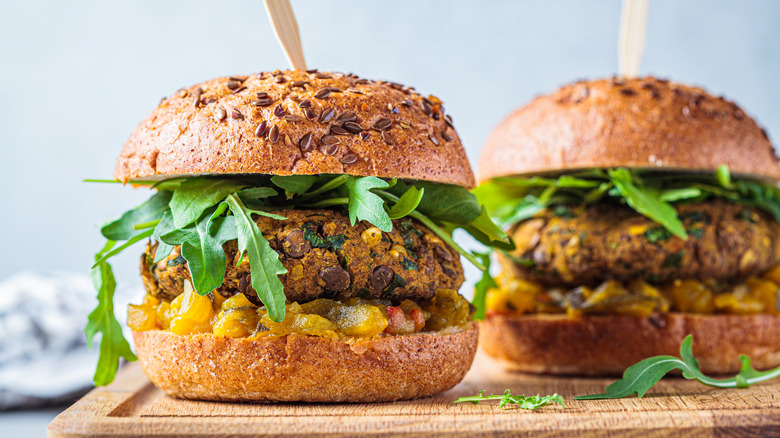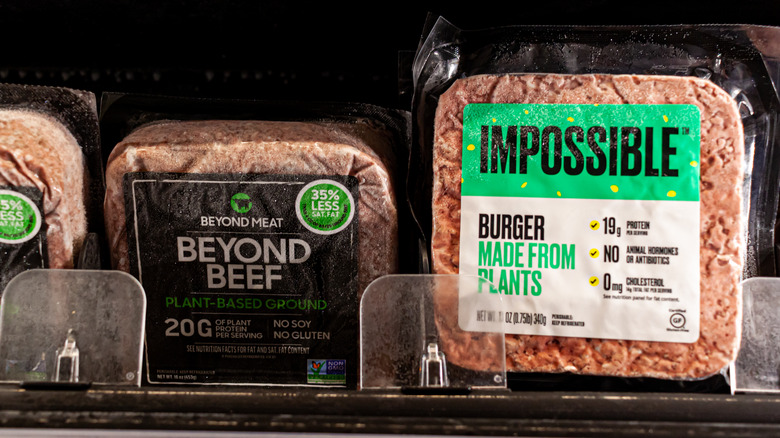The Key To Cooking Plant-Based Meat Is Minding The Salt
Plant-based meat has built such a reputation for itself that you're likely to find it on almost any standard restaurant menu these days. Not all of these meats are created equal, though, and if you're buying the stuff at the grocery store, you might find that some store-bought meats taste quite different from others.
According to The New York Times, the plant-based diet first started popping up back in the 1970s. The book "Diet for a Small Planet," which was written by Frances Moore Lappé in 1971, highlighted how much of our planet's land is dedicated to raising cattle — and how inefficient it is for properly feeding the whole world. Today, people eat plant-based for plenty of reasons, with the environment being a big one. But even those who don't consider themselves vegan have grown to like the taste of a veggie burger. If you're one who prefers to prepare your non-meat burgers at home, there is one element to consider that will help keep it healthy, with a balanced flavor: It's all about the salt.
Plant-based meats don't need much additional salt
Although they take the place of beef burgers, plant-based burgers are prepared quite differently. When cooking beef, salt is an incredibly important tool; it brings out the flavor of the dish and should be added to the meat well before cooking to ensure it can evenly distribute. The Chicago Steak Company refers to it as a "generous amount of salt" and says it should be added to meat at least 45 minutes before cooking. Aside from just burgers, this goes for other types of beef — especially steak. Seasoning your chicken consists of a similar process. When it comes to plant-based, though, salt is still important, but it's often added before it even gets to your local grocery store.
According to America's Test Kitchen, plant-based meat products already contain plenty of salt; it's added when the meat is processed, meaning the processing plant does most of that seasoning work for you. As a result, when cooking the product (or a recipe that includes it), you need much less salt overall. America's Test Kitchen says it found that recipes using plant-based meat need about 1/4 teaspoon less salt than a beef-based meal. Using less salt helps keep the meal's flavor more balanced and, of course, much healthier.
Salt is the key to a nutritious meal
Even if you love your food with a little too much salt, you should still limit your sodium intake when eating plant-based meals. Why? Because salt has a substantial impact on overall health — and too much of a good thing can quickly become a problem. Salt is necessary for our essential bodily functions, but the problem is that Americans tend to eat far too much of it. Too much salt raises blood pressure and can cause heart disease, which can lead to a heart attack or stroke. According to the American Heart Association, the ideal salt intake is about 1,500 milligrams per day, though the average American consumes more than double that: about 3,400 milligrams.
Salt intake can vary depending on how much exercise you get each day. Outside Magazine spoke with Brook Schantz, a Certified Specialist in Sports Dietetics at Loyola University Medical Center and registered dietician, who says that since sodium is released when we sweat, those who work out aggressively on a regular basis might require a greater sodium intake.
With all of that said, unless you're getting rigorous daily exercise, you should likely avoid over-salting your plant-based beef — for its best flavor, if nothing else.


